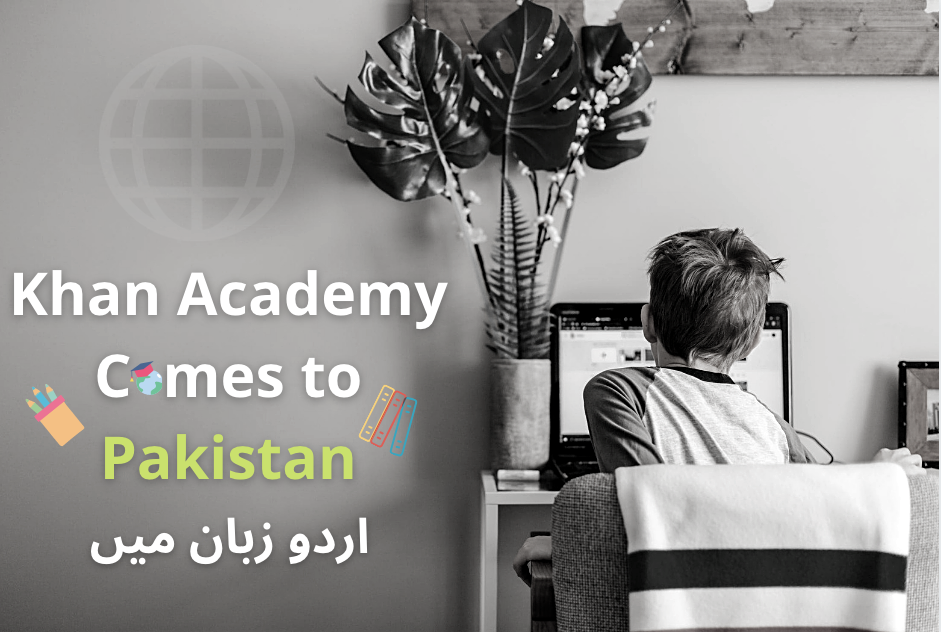Khan Academy Comes To Pakistan. Khan Academy is a world-renowned forum that provides free, top-quality, online education content. It is an American non-profit educational organization that was created in 2007 by Sal Khan, intending to create a set of online tools to help educate students.
Sal is a former Hedge Fund analyst with degrees from MIT and Harvard. The organization is famous for producing short lessons in the form of videos. About 100 million people use the platform worldwide every year. More than 10 million users globally subscribe to Khan Academy.
Since Khan Academy has a limited capacity of its own, it collaborates with external foundations, private or public entities to take ownership to localize the original English content into other languages. It has already been translated into 50 languages. The Carlos Slim foundation of Mexico and Tata foundation of India are a few examples of foundations leading this initiative in their respective countries.
Distinguishing features of the Khan Academy:
- Short and focused video content
- The friendly and empathetic tone of instruction
- Ease of use and playback feature of the video lesson
- Strong focus on core concept building.
The pandemic served as an impetus to start the Khan Academy Urdu project in Aug 2020. With extended lockdowns, the schools struggled to put up an alternative system to continue education. At the same time, we saw an increasing trend in mobile and internet users. The ubiquity of the internet as a result of recent technological advancements promised unique learning opportunities for children who previously had limited or no access to quality education.
So a vision based on a dream to provide free, world-class, quality education to all students of Pakistan was formulated. The idea was that if we could make available Khan Academy videos on YouTube in our own national language i-e Urdu then conceptual learning would just be a click away. This way children residing even in the remotest areas of Pakistan with access to the internet could learn STEM subjects in Urdu. One can imagine how fulfilling this learning experience would be for Pakistani students.
Bee Gul, a critically acclaimed writer whose latest claim to fame is her drama ‘Raqeeb Say’ is the team leader. She has put together a multifaceted team comprising engineers, doctors, and graduates of Pakistan’s leading higher educational institutes as LUMS who are also performing arts experts. The reason was that video creators needed to have an enticing voice tone and control that would engage the students for a relaxed and meaningful learning experience.
The videos need to be strictly aligned with Khan Academy’s content transcripts and trademark instruction template (black screen). Since the instruction is in Urdu, language correctness, cultural relevance, and writing captions in Urdu had to be dealt with carefully. Mr. Khalid Ahmed, a veteran artist, and the director is the project’s language expert who painstakingly reviews every video transcript. Since he has a degree in engineering from the University of California, he is completely at ease in understanding and translating STEM content.
This month marks a very important milestone for the Khan Academy Urdu project. They have announced a very important milestone of completing 1000+ videos in less than a year. It’s a momentous milestone as what started a dream during the pandemic is an appreciable reality now. This achievement also represents steps towards equal learning opportunities and culture, representative of an image of Pakistan that we all would like to see.
Reviewing the content, one can see that tremendous effort has gone into curating every single video. The tone of video instructors compels you to watch the video with an intriguing curiosity yet the manner is relaxed, almost friendly as if a friend is teaching you something they have a complete understanding of.
The length of the video is short (average 10 min) and a solid component of an area of learning is imparted in that time complete with examples and diagrams. Let us consider a Khan Academy Urdu lesson video that explains the concept of ‘scaling up a unit vector’. I deliberately did not use an introductory video to ‘vectors and scalars’ as concepts are always easy to grasp in introductory lessons.
The video starts with a method to reconfirm a unit vector. A step-by-step method is done to calculate the magnitude to reconfirm a vector being a unit vector (magnitude being one). The video then moves on to scaling up a vector and working that out. The length of the video is approximately 2 and a half minutes and explains a key concept (Vectors and Scalars) of Maths and Physics in a relaxed and engaging way. The playback feature can be used to rewind and pause at points of confusion. Here is the link to the video (scaling up a vector) I reviewed on the Khan Academy Urdu channel.
https://www.youtube.com/watch?v=U9KqQtczl_s&list=PLFcHFay5s7iRnj2uhu8vxtgb_dmmmoCRj&index=19
The Khan Academy Urdu videos have all the distinguishing features of the original Khan Academy videos along with some additional strengths such as
- Ease in comprehension of STEM subjects in Urdu
- Free accessibility of Khan Academy Urdu videos on YouTube channel
- Most captions are written in Urdu to help students studying in mainstream schools
- Provision to learn in your own time and space
- The engaging and enticing tone of instruction
- Videos can serve as supplementary tutorials eliminating the need for tuitions
I’m excited to see the translated content of Khan Academy in Pakistan. I can envision that it is going to benefit students to build conceptual understanding and hone problem-solving skills in STEM subjects. Commendable effort by the team that needs to be supported by all of us.
Subscribe and introduce the Khan Academy Urdu channel to somebody today. The links to all their videos are available on the Khan Academy website.
Subscribe to the channel: https://youtube.com/user/KhanAcademyUrdu
Urdu videos on Khan Academy: https://ur.khanacademy.org/
Facebook page: https://www.facebook.com/KhanAcademyUrdu
Instagram page: https://www.instagram.com/khanacademyurdu/
About the Author: Rabia Ahmed is the communication manager at the Khan Academy Urdu project. She has provided information regarding the motivation behind the project. Hisham Sarwar reviewed Khan Academy Urdu Videos and provided feedback which was incorporated in the article








